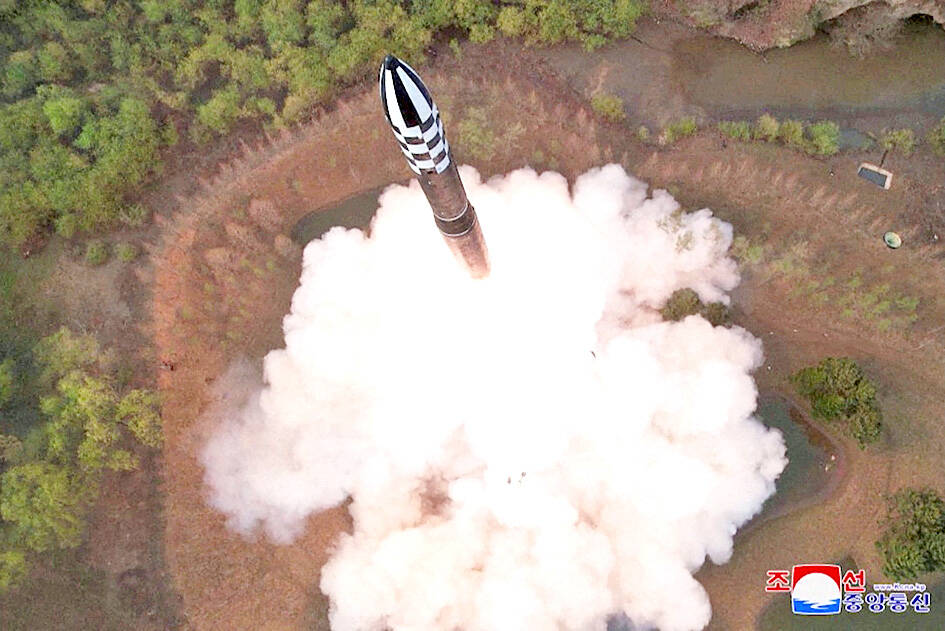Japan, the US and South Korea are negotiating an agreement on sharing real-time data on North Korean missile launches, Japanese Chief Cabinet Secretary Hirokazu Matsuno said yesterday.
There has been no agreement yet, but “I understand that defense authorities are vigorously proceeding to set up an arrangement,” Matsuno said.
“The security environment surrounding Japan and South Korea is becoming more severe and more complex, and coordination between the two countries, as well as trilaterally with the United States, has become increasingly important,” he said.

Photo: Reuters
Japan and South Korea have been separately linked to data from US radar systems, but not directly to each other due to difficult relations strained by disputes over history, most recently over South Korean court rulings in 2018 ordering Japanese companies to compensate South Korean workers for abuses including forced labor during World War II.
Leaders of the three countries in November last year agreed to speed up information sharing on North Korean missile launches.
Japan’s Yomiuri newspaper reported earlier yesterday that Tokyo and Seoul are nearing an agreement on connecting their radars via a US system to share real-time North Korean missile warning information, which would help strengthen Japanese missile defense capabilities.
The Yomiuri said that the three countries are expected to reach an agreement early next month on the sidelines of the Shangri-La Dialogue, an annual defense ministers’ conference in Singapore.
Japanese and South Korean defense ministers would hold bilateral talks during the conference, the newspaper said.

CHAOS: Iranians took to the streets playing celebratory music after reports of Khamenei’s death on Saturday, while mourners also gathered in Tehran yesterday Iranian Supreme Leader Ayatollah Ali Khamenei was killed in a major attack on Iran launched by Israel and the US, throwing the future of the Islamic republic into doubt and raising the risk of regional instability. Iranian state television and the state-run IRNA news agency announced the 86-year-old’s death early yesterday. US President Donald Trump said it gave Iranians their “greatest chance” to “take back” their country. The announcements came after a joint US and Israeli aerial bombardment that targeted Iranian military and governmental sites. Trump said the “heavy and pinpoint bombing” would continue through the week or as long

TRUST: The KMT said it respected the US’ timing and considerations, and hoped it would continue to honor its commitments to helping Taiwan bolster its defenses and deterrence US President Donald Trump is delaying a multibillion-dollar arms sale to Taiwan to ensure his visit to Beijing is successful, a New York Times report said. The weapons sales package has stalled in the US Department of State, the report said, citing US officials it did not identify. The White House has told agencies not to push forward ahead of Trump’s meeting with Chinese President Xi Jinping (習近平), it said. The two last month held a phone call to discuss trade and geopolitical flashpoints ahead of the summit. Xi raised the Taiwan issue and urged the US to handle arms sales to

A magnitude 5.6 earthquake struck off the coast of Yilan County at 12:37pm today, with clear shaking felt across much of northern Taiwan. There were no immediate reports of damage. The epicenter of the quake was 16.9km east-southeast of Yilan County Hall offshore at a depth of 66.8km, Central Weather Administration (CWA) data showed. The maximum intensity registered at a 4 in Yilan County’s Nanao Township (南澳) on Taiwan’s seven-tier scale. Other parts of Yilan, as well as certain areas of Hualien County, Taipei, New Taipei City, Taoyuan, Hsinchu County, Taichung and Miaoli County, recorded intensities of 3. Residents of Yilan County and Taipei received

Taiwan has secured another breakthrough in fruit exports, with jujubes, dragon fruit and lychees approved for shipment to the EU, the Ministry of Agriculture said yesterday. The Animal and Plant Health Inspection Agency on Thursday received formal notification of the approval from the EU, the ministry said, adding that the decision was expected to expand Taiwanese fruit producers’ access to high-end European markets. Taiwan exported 126 tonnes of lychees last year, valued at US$1.48 million, with Japan accounting for 102 tonnes. Other export destinations included New Zealand, Hong Kong, the US and Australia, ministry data showed. Jujube exports totaled 103 tonnes, valued at